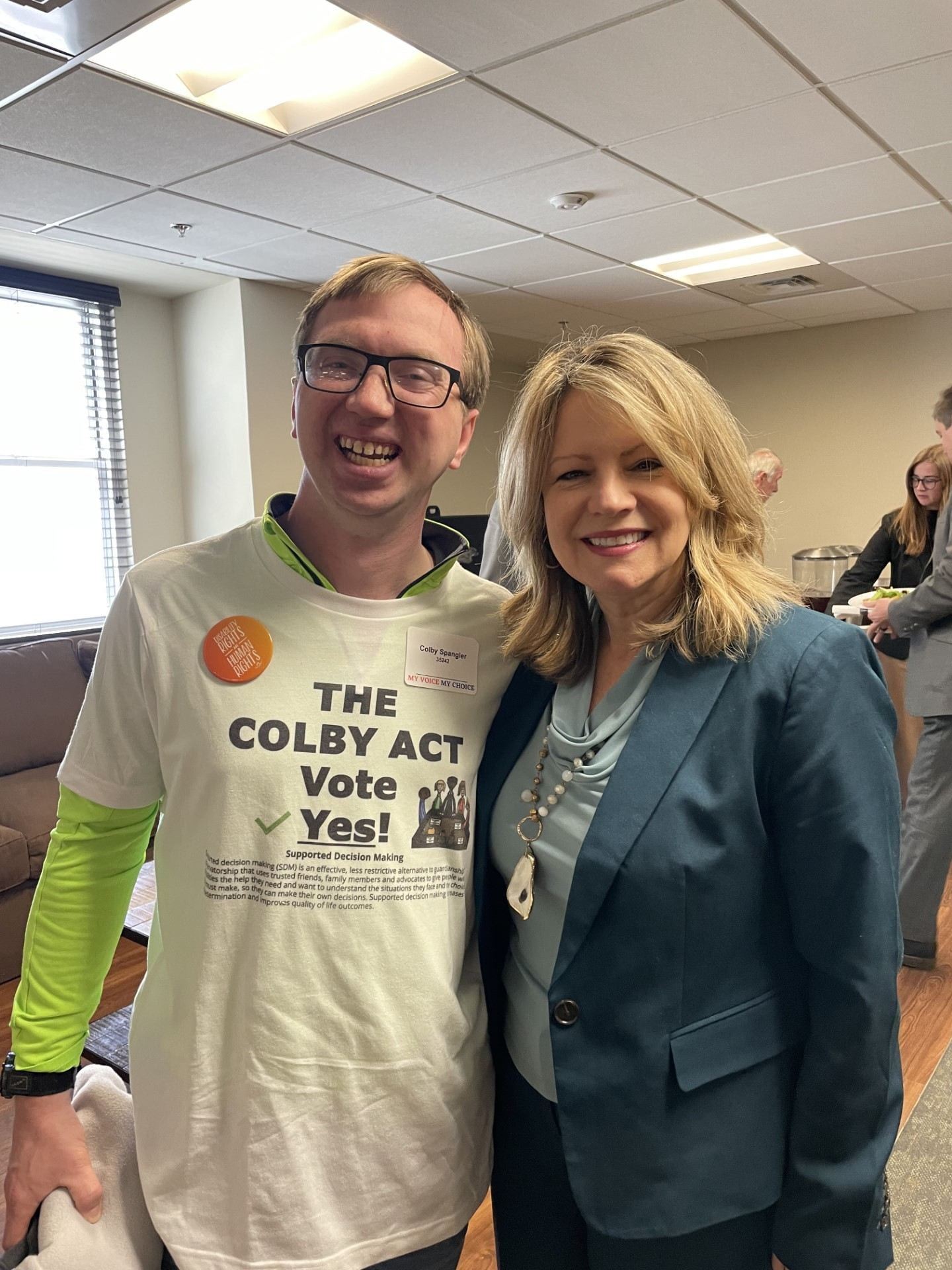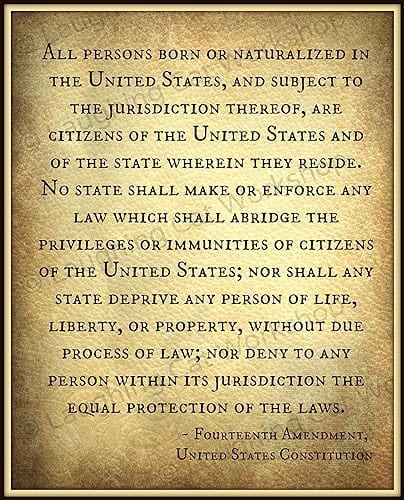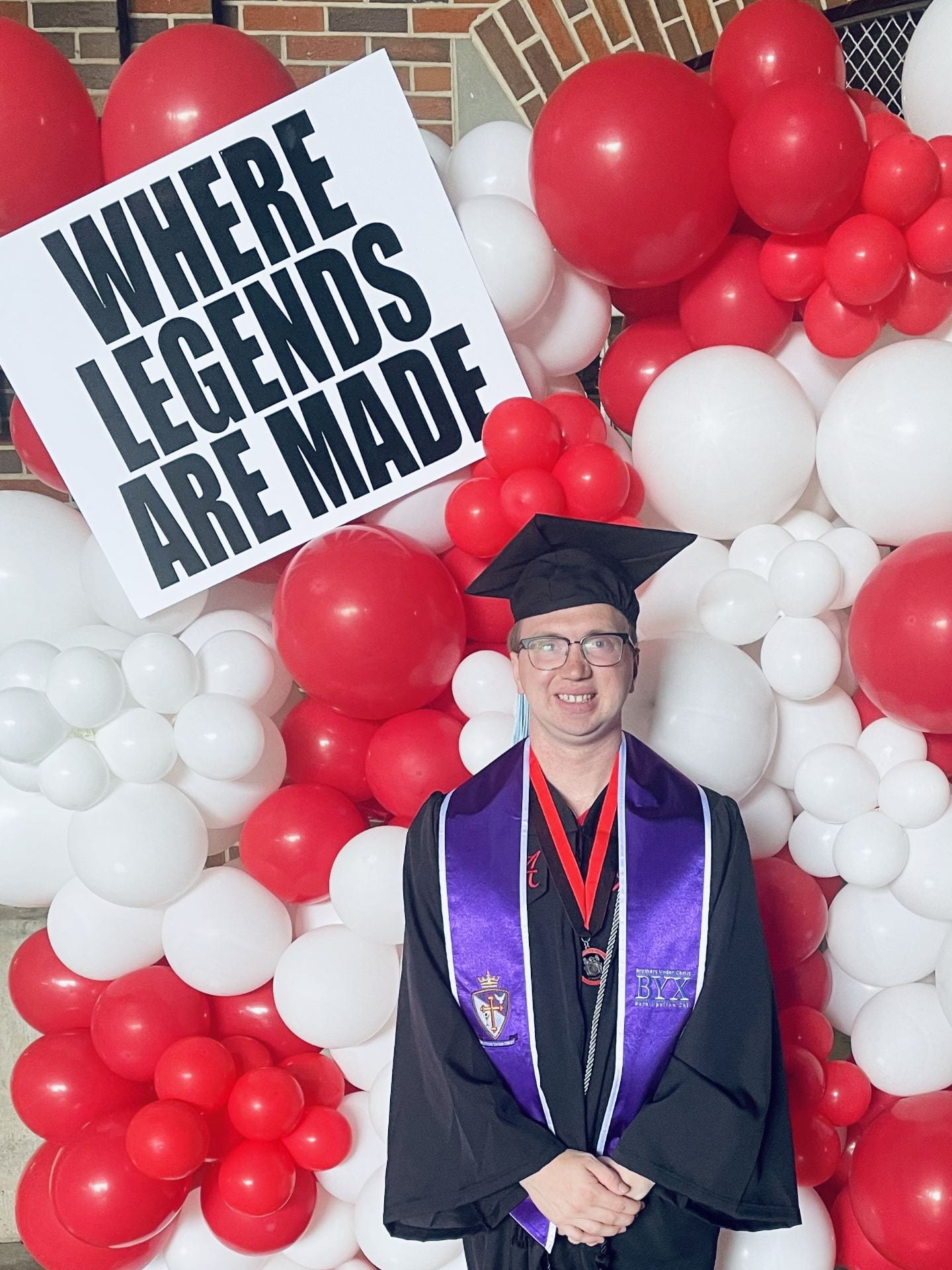by Lexie Woolums
“It will help me live a full life — to vote, to marry, and to go to church. It will help people with disabilities to live their own lives and speak for themselves.” – Colby Spangler.
How the Colby Act Began
The Colby Act is named after Colby Spangler, a Shelby County resident who was born with cerebral palsy.
Kim Spangler, Colby’s mom, remembers when she and Colby attended the Spring concert for Colby’s high school band. Colby had been in the school’s band for a year as a freshman. At this concert, the seniors stood up and declared where they would be attending college.
This prompted Colby to ask his mom where he would be going to college, which is something she had yet to consider.
Throughout Colby’s high school career, they began researching colleges that he could attend. Through this research, they learned that Colby’s individualized education plan (IEP) had to reach a certain degree for him to qualify to attend college. They also learned that most college programs preferred or even required that the student was their own guardian rather than being under guardianship by someone else, which was important to note since guardianship is a common occurrence as young people with disabilities become legal adults in Alabama at the age of nineteen. Some critics have called this the “school to guardianship pipeline.”
According to Kim, many people do not realize how many rights people sign away with guardianship, such as the right to vote, marry, and even where you can live.
Through this knowledge, combined with Kim’s advocacy as Colby went through high school, the Colby Act was born. Kim introduced the act in 2022, sponsored by Senator Arthur Orr (R-Decatur) and Cynthia Almond (R-Tuscaloosa). After being unanimously passed on April 20, 2023, the bill was signed into law by Governor Ivey and later went into effect on August 1, 2023. I will discuss this in further detail later, but the Colby Act proposes a legal alternative to guardianship known as supported decision-making. This is an important improvement for disabled people and elderly people since it will preserve their autonomy.

who co-sponsored The Colby Act with Senator Arthur Orr.
History of Disability Advocacy in America
In the United States, people with disabilities have historically had their rights ignored or entirely removed. While I will not go into explicit detail here, my colleague, James DeLano, recently wrote an article about the atrocities of institutions for disabled people. Though institutions in the context of James’s discussion are far from the only instances where disabled people face being stripped of their rights, I found the brief history to be exceedingly informative as I wrote this article.
Legally and socially, disability rights have not always been viewed as civil rights but through a lens of charity, especially in the case of developmental and intellectual disabilities. Beyond that, legal action to protect disabled Americans came exceptionally slowly.
In 1977, President Carter’s new HEW (Housing, Education, and Welfare) Secretary, Joseph Califano, formed a review board to consider an act that would protect disabled people under federal law. Unfortunately, the board did not include anyone from the disabled community, so many people were concerned that the law would have critical aspects of it removed before being passed. The American Coalition of Citizens with Disabilities (ACCD) pushed for the signing of the regulations as they were, with nothing removed by the review board. They stated that if the piece was not signed by April 5, they would respond.
As the date passed with no action, protests began. In April of 1977, around 150 disability advocates staged a sit in a federal building in San Francisco. They remained there for 25 days, refusing to leave until the Carter Administration signed the law that promised to protect people with disabilities. Similar protests broke out across the United States, but most only lasted a few days, making San Francisco one the most impactful.

These are known today as the Section 504 protests. They were a significant turning point because disabled people publicly rejected the pity and charity sentiments and held the Carter Administration accountable for giving them the same protections as every other American.
“Through the sit-in, we turned ourselves from being oppressed individuals into being empowered people. We demonstrated to the entire nation that disabled people could take control over our own lives and take leadership in the struggle for equality,” said activist Judith Heumann.
Through the protests and meetings with the Carter Administration, Section 504 was passed. Beyond that, Section 504 of the Rehabilitation Act of 1973 laid the groundwork for the Americans with Disability Act (ADA), which prevented any institution receiving federal funds from discriminating based on ability.

Considering the history of disability advocacy in the US, we have come a long way. Despite that, there is still a lot of work to be done, especially for people with intellectual disabilities.
Distinction of Conservatorship and Guardianship in Alabama
Before diving into what the Colby Act does for Alabamians today, I want to address the elephant in the room and make an important distinction.
Over the past couple of years, there have been a few cases where conservatorships have come under fire, most notably with US pop star Britney Spears. Her father, Jamie Spears, became the conservator of her financial estate and personal life in 2008. One of the more significant outcries from this was when Britney Spears commented that she could not get married and have kids due to her conservatorship. More specifically, she claimed that they would not allow her to have her birth control removed. Many aspects of this conservatorship were considered abusive by much of the general public, sparking the Free Britney movement in 2021. I bring this up to clarify an essential distinction in discussing conservatorships.
Other stories like this have been brought to the public’s attention recently, bringing awareness to conservatorship abuse. With that being said, not all of them represent how conservatorships function in Alabama. In California, where the Spears conservatorship was established, conservators have jurisdiction over the ward’s financial estate and personal life decisions, which would not be the case in Alabama. In Alabama, a conservator has jurisdiction over the person’s estate. In contrast, a guardian would have jurisdiction over a person’s decisions, including the ability to get married or have children.
To put it simply, a guardian makes decisions for a person’s everyday life, and a conservator makes decisions for their financial estate. So, in the state of Alabama, for a person to have the control that Jamie Spears had, they would have to obtain two distinct approvals from a Probate Court: one for a conservatorship of the person’s estate and the other for a guardianship of the person’s decisions in their personal life. With that distinction in mind, we will look at how guardianships impact people with disabilities.

with Colby at a Partners in Policy for Alabama Event
Guardianships for Disabled People in Alabama
In Alabama, the primary way for parents of people with disabilities to help protect their children and young adults as they transition into adulthood at the age of nineteen is by getting guardianship over them.
Guardianship is used when a court proceeding finds a person to be incapacitated. According to the Alabama Disability Advocacy Program (ADAP), Alabama law defines an incapacitated person as “any person who has one or more of the following impairments: mental illness, mental deficiency, physical illness or disability, physical or mental infirmities accompanying advanced age, chronic use of drugs, chronic intoxication, or other cause (except minority), and lacks the ability to make or communicate responsible decisions.”
In essence, guardianship allows another person to make decisions if a court determines someone is incapacitated. Similarly, conservatorship enables another person to make decisions about a person’s estate if a court determines that someone is incapacitated.
The important thing I want to note here is that to be legally declared incapacitated, the person must have one of the listed impairments and lack the ability to make responsible decisions. The person petitioning for guardianship or conservatorship must prove to a judge that the person is incapacitated based on these criteria.
Many people have guardians for a variety of reasons. For example, many older adults struggle to make responsible decisions and keep themselves and others safe as they grow older, so guardianship is sometimes needed so that family members can help with medical appointments and make decisions about other fundamental aspects of the person’s life.
While guardianships are necessary for some people who are disabled, they have been used as a one-size-fits-all solution, which fails to account for the varying abilities and needs of different people with disabilities.
Guardianship also proves problematic if a guardian decides they no longer want to have the responsibilities of being a guardian. More commonly, the guardian dies, which can result in a delay in decision-making for the ward (the person for whom the guardianship is for).
Often, it takes time for a new guardian to be set up. In many cases, the ward will become a ward of the state, which means that a judge, or, in some cases, even a sheriff, can become the ward’s guardian. State wards are often overworked and underfunded. Beyond that, they have little personal connection to the ward, which increases the risk of the person’s quality of life declining significantly.

Autonomy vs. Protection
One concern for people who have disabilities, especially intellectually disabled people, is the fear of people taking advantage of them. Commonly, guardianships have been established to protect the person from harm, even though they don’t always give parents the protection they seek for the adult.
For example, suppose a young adult has a past of being a victim of domestic abuse. In that case, guardianship may not necessarily protect them from that. Still, it is often viewed as a sort of legal footstep for the guardian to step in if things go wrong. Unfortunately, this is not always effective and is still extremely limited in its ability to prevent harm.
While some disabled people may require guardians, the one-size-fits-all approach of guardianship has been seen as the only option for far too long.
What The Colby Act Does for Alabamians Today
The Colby Act introduces the concept of supported decision-making for adults with disabilities in Alabama, making it the 19th state with supported decision-making (SDM) laws.
The Colby Act defines supported decision-making as “The process of supporting and accommodating an adult in the decision-making process without impeding the self-determination of the adult. This term includes assistance in making, communicating, and effectuating life decisions.” More specifically, the act states the following: “In lieu of a guardianship, an adult may enter into a supported decision-making agreement with supporters who may assist and advise the adult with making certain decisions without impeding the adult’s self-determination.”
This is a critical option for a disabled person who may need assistance making decisions but is not incapacitated as defined by the state, in which case a guardianship would unnecessarily strip them of their autonomy. This can also be a helpful option for aging adults since setting up an SDM agreement can prevent the need for guardians or conservators as they become elders.
The Colby Act defines a supporter as “An individual at least 18 years of age who has voluntarily entered into a supported decision-making agreement with an adult and is designated as such in a supported decision-making agreement.” It also establishes criteria for supporters and limitations on them, such as not obtaining information about the person for purposes beyond their role as a supporter.
Another significant piece of the act is the subject can revoke the SDM agreement at any time by notifying each supporter in writing. This is important because it preserves the adult’s agency and autonomy, allowing them to change the agreement or revoke it if it does not facilitate their ability to live a full life as anyone else would.

CCOS program at the University of Alabama.
The Colby Act is a big deal because it provides a law for something that has been happening informally for a long time. Due to the passing of the Colby Act, people who create supported decision-making agreements will now have additional protections behind the law. Though supported decision-making may not be an effective alternative for every instance where a family is considering guardianship, it is a substantial step in providing an alternative for disabled people who could benefit from a less invasive approach.

